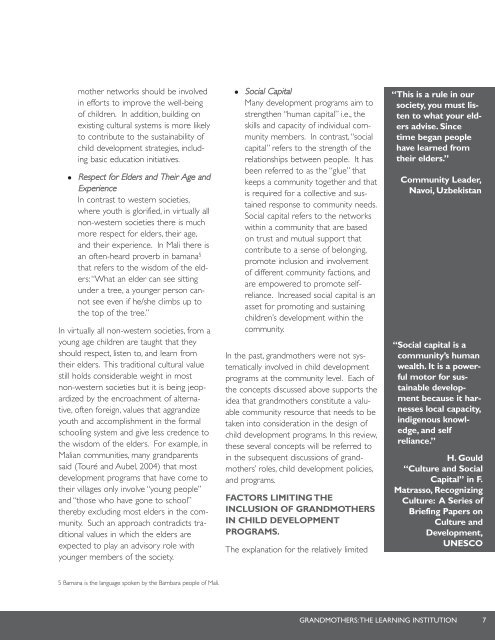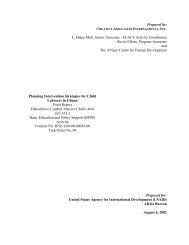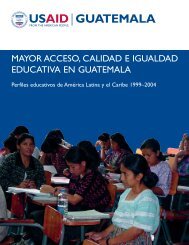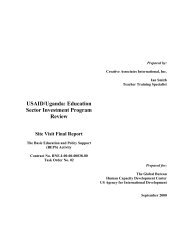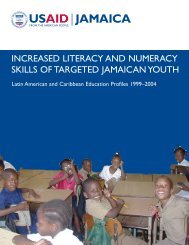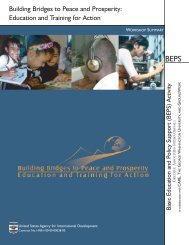“Culture tells peoplehow to view the world,how to experience itemotionally <strong>and</strong> howto behave in relationto other people, supernaturalforces <strong>and</strong> inrelation to their environment.It is the ‘lens’through which peopleperceive <strong>and</strong> underst<strong>and</strong>the world inwhich they live.”J. Sengendo“Culture <strong>and</strong> Health”in F. MatrassoRecognizing Culture:ASeries of BriefingPapers on Culture <strong>and</strong>DevelopmentUNESCOrelation to the roles, attitudes <strong>and</strong>practices of all key family <strong>and</strong> communityactors. In this more holisticapproach, program strategies aim toreinforce the various actors within thefamily system, including gr<strong>and</strong>mothers,who influence children’s well-being.• Assets-based ApproachWhile all families <strong>and</strong> communitieshave inadequacies <strong>and</strong> problems, theperception of those weaknesses byprograms <strong>and</strong> staff significantly determinetheir attitudes toward them <strong>and</strong>the type of interventions developed.Kretzmann <strong>and</strong> McKnight (1993) suggestthat often in social programs thefocus is put on the problems or“deficits” in a community, while inthose same communities there areundoubtedly certain resources, or“assets” on which to build.They referto the latter option as an “assetsbasedapproach.” Applied to childdevelopment programs, this latterapproach implies that programsshould, first, identify existing family<strong>and</strong> community resources that contributeto child development, <strong>and</strong>second, aim to strengthen them.<strong>Gr<strong>and</strong>mothers</strong> constitute one of theexisting resources that can bestrengthened in such programs.• Cultural Structures, Roles, <strong>and</strong> Valuesas a Foundation for ProgramDevelopmentWhile lip service is often given to theimportance of cultural realities todevelopment programs, often thecultural dimension is absent fromdevelopment planners’ frameworks<strong>and</strong> program designs (Serageldin1994). In the past few years, itappears that this dimension of developmentplanning is being givensomewhat greater attention. FormerWorld Bank Vice President IsmailSerageldin argues that “A culturalframework is … a sine qua non tohave relevant, effective institutionsrooted in authenticity <strong>and</strong> traditionyet open to modernity <strong>and</strong> change”(Serageldin, 19).To some extent the cultural dimensionhas been taken into account indevelopment projects, yet too often“culture” is considered in a verysuperficial way <strong>and</strong> is equated with acultural practice (i.e. how initiationceremonies for young girls are organized)(Pelto 2003). In this regard,social psychologist Pepitone (1981)proposes a more inclusive definitionof “culture” composed of two interrelatedfacets. First, there are thesocial structures <strong>and</strong> organizations inwhich individuals exist in relation tothe family, kinship, roles, hierarchies,<strong>and</strong> communication nets. Second,there are the normative systems thatinclude the values <strong>and</strong> beliefs promotedwithin the family system thataffect behavior. In child developmentprograms, <strong>and</strong> development programsin general, the tendency hasbeen to ignore the first facet. Ifchild development programs aim tobuild on existing culturally-definedfamily <strong>and</strong> community roles, hierarchies,<strong>and</strong> communication nets, thisimplies that gr<strong>and</strong>mothers <strong>and</strong> gr<strong>and</strong>6 UNITED STATES AGENCY FOR INTERNATIONAL DEVELOPMENT
mother networks should be involvedin efforts to improve the well-beingof children. In addition, building onexisting cultural systems is more likelyto contribute to the sustainability ofchild development strategies, includingbasic education initiatives.• Respect for Elders <strong>and</strong> Their Age <strong>and</strong>ExperienceIn contrast to western societies,where youth is glorified, in virtually allnon-western societies there is muchmore respect for elders, their age,<strong>and</strong> their experience. In Mali there isan often-heard proverb in bamana 5that refers to the wisdom of the elders:“Whatan elder can see sittingunder a tree, a younger person cannotsee even if he/she climbs up tothe top of the tree.”In virtually all non-western societies, from ayoung age children are taught that theyshould respect, listen to, <strong>and</strong> learn fromtheir elders. This traditional cultural valuestill holds considerable weight in mostnon-western societies but it is being jeopardizedby the encroachment of alternative,often foreign, values that aggr<strong>and</strong>izeyouth <strong>and</strong> accomplishment in the formalschooling system <strong>and</strong> give less credence tothe wisdom of the elders. For example, inMalian communities, many gr<strong>and</strong>parentssaid (Touré <strong>and</strong> Aubel, 2004) that mostdevelopment programs that have come totheir villages only involve “young people”<strong>and</strong> “those who have gone to school”thereby excluding most elders in the community.Such an approach contradicts traditionalvalues in which the elders areexpected to play an advisory role withyounger members of the society.• Social CapitalMany development programs aim tostrengthen “human capital” i.e., theskills <strong>and</strong> capacity of individual communitymembers. In contrast,“socialcapital” refers to the strength of therelationships between people. It hasbeen referred to as the “glue” thatkeeps a community together <strong>and</strong> thatis required for a collective <strong>and</strong> sustainedresponse to community needs.Social capital refers to the networkswithin a community that are basedon trust <strong>and</strong> mutual support thatcontribute to a sense of belonging,promote inclusion <strong>and</strong> involvementof different community factions, <strong>and</strong>are empowered to promote selfreliance.Increased social capital is anasset for promoting <strong>and</strong> sustainingchildren’s development within thecommunity.In the past, gr<strong>and</strong>mothers were not systematicallyinvolved in child developmentprograms at the community level. Each ofthe concepts discussed above supports theidea that gr<strong>and</strong>mothers constitute a valuablecommunity resource that needs to betaken into consideration in the design ofchild development programs. In this review,these several concepts will be referred toin the subsequent discussions of gr<strong>and</strong>mothers’roles, child development policies,<strong>and</strong> programs.FACTORS LIMITING THEINCLUSION OF GRANDMOTHERSIN CHILD DEVELOPMENTPROGRAMS.The explanation for the relatively limited“This is a rule in oursociety, you must listento what your eldersadvise. Sincetime began peoplehave learned fromtheir elders.”Community Leader,Navoi, Uzbekistan“Social capital is acommunity’s humanwealth. It is a powerfulmotor for sustainabledevelopmentbecause it harnesseslocal capacity,indigenous knowledge,<strong>and</strong> selfreliance.”H. Gould“Culture <strong>and</strong> SocialCapital” in F.Matrasso, RecognizingCulture: A Series ofBriefing Papers onCulture <strong>and</strong>Development,UNESCO5 Bamana is the language spoken by the Bambara people of Mali.GRANDMOTHERS:THE LEARNING INSTITUTION7
- Page 1 and 2: GRANDMOTHERS:A LEARNING INSTITUTION
- Page 3: GRANDMOTHERS:A LEARNING INSTITUTION
- Page 11 and 12: EXECUTIVE SUMMARYSociety itself fai
- Page 13 and 14: Education, the Bernard Van LeerFoun
- Page 15 and 16: SEVERAL FACTORS CONTRIBUTE TO THELI
- Page 17: - Who am I? Assign children to askf
- Page 20 and 21: in educational activities on home t
- Page 22 and 23: “A grandmother’s understandingo
- Page 26 and 27: attention given to grandmothers’
- Page 28 and 29: social work, including family syste
- Page 30 and 31: mation from Azerbaijan (McNulty 200
- Page 32 and 33: “The status of eldersin tradition
- Page 34 and 35: “As women, thegrandmothers haveli
- Page 36 and 37: members often consult the moreexper
- Page 38 and 39: “Social capital is a community’
- Page 40 and 41: In a collaborative effort between
- Page 42 and 43: in-laws and the additional free tim
- Page 44 and 45: "Involving grandmothersin community
- Page 50 and 51: CULTURALLY-ADAPTED EDUCATIONMATERIA
- Page 52 and 53: strated the power of participatory
- Page 54 and 55: effects of the new ideas, their con
- Page 57 and 58: V. GRANDMOTHERS: A LEARNING INSTITU
- Page 59 and 60: Many health and development workers
- Page 61 and 62: VI. RECOMMENDATIONS FORBASIC EDUCAT
- Page 63 and 64: parents themselves did not go to sc
- Page 65 and 66: community ties by increasing teache
- Page 67 and 68: of millions. On the other hand, som
- Page 69: teachers, teacher abuse of children
- Page 73 and 74: APPENDIX B:ANNOTATEDREFERENCES ON T
- Page 75 and 76:
acceptable for younger women to mak
- Page 77 and 78:
showed that men are not directly in
- Page 79 and 80:
ecause they had more time to devote
- Page 81 and 82:
matrilineal or patrilineal areas
- Page 83 and 84:
diet, work, fetal development, sexu
- Page 85 and 86:
in the family and social networks.
- Page 87 and 88:
elated, for example, to early child
- Page 89 and 90:
REFERENCESAdams, A. M., S. Madhavan
- Page 91 and 92:
BASICS and LINKAGES. 1998. Influenc
- Page 93 and 94:
Childhood Education and Development
- Page 95 and 96:
Krishna, A. and N. Uphoff. June 199
- Page 97 and 98:
Sear, R., R. Mace, and I. A. McGreg
- Page 99 and 100:
ABOUT THE AUTHORThis review was pre


